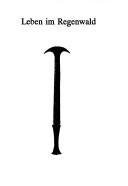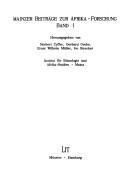| Listing 1 - 7 of 7 |
Sort by
|

ISBN: 3894733586 9783894733582 Year: 1998 Publisher: Hamburg LIT
Abstract | Keywords | Export | Availability | Bookmark
 Loading...
Loading...Choose an application
- Reference Manager
- EndNote
- RefWorks (Direct export to RefWorks)
Ethnology --- Bolongo (African people) --- Anthropologie sociale et culturelle --- Congo (Democratic Republic) --- Belgium --- Congo (République démocratique) --- Belgique --- Politics and government. --- Colonies --- Politique et gouvernement --- #SBIB:39A73 --- #SBIB:39A11 --- Etnografie: Afrika --- Antropologie : socio-politieke structuren en relaties --- Congo (République démocratique)
Book
ISBN: 392608006X 9783926080066 Publisher: Darmstadt Pöapö
Abstract | Keywords | Export | Availability | Bookmark
 Loading...
Loading...Choose an application
- Reference Manager
- EndNote
- RefWorks (Direct export to RefWorks)
Ethnology --- Oral tradition --- Decentralization in government --- History --- Tradition, Oral --- Oral communication --- Folklore --- Oral history --- Cultural anthropology --- Ethnography --- Races of man --- Social anthropology --- Anthropology --- Human beings --- Centralization in government --- Devolution in government --- Government centralization --- Government decentralization --- Government devolution --- Political science --- Central-local government relations --- Federal government --- Local government --- Public administration --- Rwanda --- Republika y'u Rwanda --- Rwandu --- Ruanda --- République rwandaise --- Republic of Rwanda --- Résidence du Ruanda --- Republika Nyarwanda --- Repubulika y'Urwanda --- Rwandese Republic --- République du Rwanda --- Repubulika y'u Rwanda --- ルワンダ --- Ruwanda --- רואנדה --- Ruʼandah --- Jamhuri ya Rwanda --- Руанда --- Республика Руанда --- Respublika Ruanda --- 卢旺达 --- Luwangda --- Ruanda-Urundi --- Civilization. --- Politics and government --- Effect of civilization on. --- Ethnology - Rwanda - History - 19th century. --- Oral tradition - Rwanda - History - 19th century. --- Decentralization in government - Rwanda - History - 19th century.
Book
ISBN: 9789071093647 9071093646 Year: 2010 Publisher: Wassenaar NIAS
Abstract | Keywords | Export | Availability | Bookmark
 Loading...
Loading...Choose an application
- Reference Manager
- EndNote
- RefWorks (Direct export to RefWorks)
Social stratification --- Rwanda --- E-working papers --- Conferences - Meetings
Book
ISBN: 3894736984 Year: 1994 Publisher: Münster : Lit-Verlag,
Abstract | Keywords | Export | Availability | Bookmark
 Loading...
Loading...Choose an application
- Reference Manager
- EndNote
- RefWorks (Direct export to RefWorks)
Book
ISBN: 3737008086 Year: 2017 Publisher: Göttingen : V&R unipress ; : Mainz University Press,
Abstract | Keywords | Export | Availability | Bookmark
 Loading...
Loading...Choose an application
- Reference Manager
- EndNote
- RefWorks (Direct export to RefWorks)
Öffentliche Sammlungen bewahren vielfach Dinge, die heute aus ethischen Gründen als sensibel eingestuft werden. Im Fokus stehen seit einigen Jahren die NS-Raubkunst und zunehmend auch Kulturgüter, die im Rahmen der Kolonialisierung nach Europa verbracht wurden. Doch gibt es noch viele weitere Arten sensibler Dinge wie sterbliche Überreste, religiöse Artefakte, illegal gehandelte Antiken oder unter den Artenschutz fallende Naturalia. Der Band wählt eine dezidiert vergleichende Perspektive und geht der Frage nach einem angemessenen Umgang mit diesen Objekten disziplinen- und institutionenübergreifend nach. Durch den Erfahrungsaustausch von Wissenschaftlerinnen und Wissenschaftlern aus Museen und Universitäten nimmt er das Thema erstmals auch systematisch für universitäre Sammlungen in den Blick, die aufgrund ihrer Heterogenität ein besonders breites Spektrum potentiell sensibler Objekte abdecken. Public collections often preserve things that are nowadays considered 'sensitive' for ethical reasons. For some years, the focus has been on Nazi looted art and is now increasingly being directed at cultural assets brought to Europe as part of colonisation. There are, however, many other types of sensitive things, such as mortal remains, religious artefacts, illegally traded antiques and wildlife products that fall under the protection of endangered species. This volume chooses to take on a decidedly comparative perspective in investigating how to appropriately deal with these objects across disciplines and institutions. For the first time, through the exchange of experience between scientists from museums and universities, it also systematically examines the topic for university collections, which, due to their heterogeneity, cover a particularly wide range of potentially sensitive objects.
Art thefts. --- Cultural property --- Jewish property. --- Repatriation. --- Property, Jewish --- Property --- Repatriation of cultural property --- Cultural policy --- Art --- Art robberies --- Art stealing --- Plunder of the arts --- Theft --- Repatriation --- Government policy --- Law and legislation --- Thefts
Book
ISBN: 9783847108085 Year: 2017 Publisher: Göttingen, Niedersachs V&R unipress
Abstract | Keywords | Export | Availability | Bookmark
 Loading...
Loading...Choose an application
- Reference Manager
- EndNote
- RefWorks (Direct export to RefWorks)

ISBN: 3894733578 Year: 1992 Publisher: Münster LIT
Abstract | Keywords | Export | Availability | Bookmark
 Loading...
Loading...Choose an application
- Reference Manager
- EndNote
- RefWorks (Direct export to RefWorks)
| Listing 1 - 7 of 7 |
Sort by
|

 Search
Search Feedback
Feedback About UniCat
About UniCat  Help
Help News
News